This year, Massachusetts and much of the United States will celebrate the 400th Anniversary of that which many of them believe to be the “First Thanksgiving.” They are celebrating a fraud. The 400th Anniversary of the First American Thanksgiving happened in 2019. As with much of that which we are taught about American history, Yankee myths frequently commandeer historical truths.
The origins of many, if not most, American concepts began in Virginia and to a lesser degree, North Carolina. The Declaration of Independence was written by a Virginian (Jefferson). Much of the Constitution was drafted by a Virginian (Madison) and heavily influenced by the Virginia Constitution. The idea of responsive and representative government may have had its origins in Enlightenment Era Europe, but Virginia’s Nathaniel Bacon was the first on the North American continent to lead a rebellion to hold English rule accountable. Bacon’s “Declaration of the People” could be read to the Biden Administration, today. The little-known North Carolina Regulators fired the first shot toward American independence, four years before Lexington and Concord’s Minute Men. Yet, if you read modern American history books, the overwhelming emphasis is placed upon Yankee contributions to the United States. This takes me to Thanksgiving.
Unlike that which was replayed annually on A Charlie Brown Thanksgiving, the holiday we associate with turkey and dressing did not originate with the Pilgrims of Massachusetts. The first unofficial American Thanksgiving was held in Jamestown, Virginia, in June 1610. That occurred ten years prior to the arrival of the Pilgrims, and eleven years before their first Thanksgiving in 1621. There are distinct differences between the two colonies which must be understood, first, before one can understand why the Southern tradition of Thanksgiving is that which you celebrate today, and yet, the Yankees co-opted it as their own.
To begin, the origins of the Jamestown settlement and the Virginia colony are too big of a topic for this piece, but it is important to understand that Jamestown was originally a settlement of aristocratic “second sons,” opening the door to later Cavaliers. These second sons of British minor nobility were denied British land grants by virtue of their birth. Eldest sons inherited title and land. For minor nobility, the prospects of second sons of the 17th Century were slim and often found in military service. The Jamestown Colony, originally led by a privateer, Christopher Newport, was comprised of men who knew how to fight, but knew nothing of hunting or farming. When the second wave of settlers came, comprised of Prussian and Polish craftsmen, as well as a couple of women, they too lacked the skills to develop sustainable food. Still, that which began as a small group in 1607, grew to nearly five hundred settlers. Ultimately, a time called the “Starving Time” wiped out almost 80% of the colony during the winter of 1609-10, largely due to their lack of agrarian capacity.
The German settlers, for their part, betrayed their English counterparts, taking guns to the native Powhatan in exchange for food. Surrounded by enemies and privation, the depleted colony set sail in the summer of 1610, abandoning Virginia, only to be stopped by a food supply ship that turned them around in June 1610 at the mouth of the Chesapeake Bay. Had the supply ship arrived a few hours later than it did, this would have marked the second failed Anglo colony in the American South (the first being the lost Roanoke Colony of North Carolina). It is probable that the English may have chosen to avoid the South and we would have a very different United States than the one we have today.
Getting back to the holiday, the first unofficial Thanksgiving – thanking God for the relief ships – was held on June 7th, 1610. The remembrance of that event continued for nine years, as settlers continued to come to Virginia, replenishing the colony and introducing agricultural skills. By 1619, Jamestown was a successful trading town by sheer Anglo-Saxon grit and determination. John Rolfe had cultivated tobacco – highly profitable at the time – while the Polish settlers had established a lucrative glass making manufacturing site (the first of its kind in the New World). Meanwhile, agricultural techniques adopted from England and modified for the Virginia climate and soil, enabled a flourishing, self-sustaining colony. On December 4th, 1619, two years before the Pilgrims had their Thanksgiving, Virginians celebrated multiple sustained harvests with a Thanksgiving feast held at nearby Berkeley Plantation.
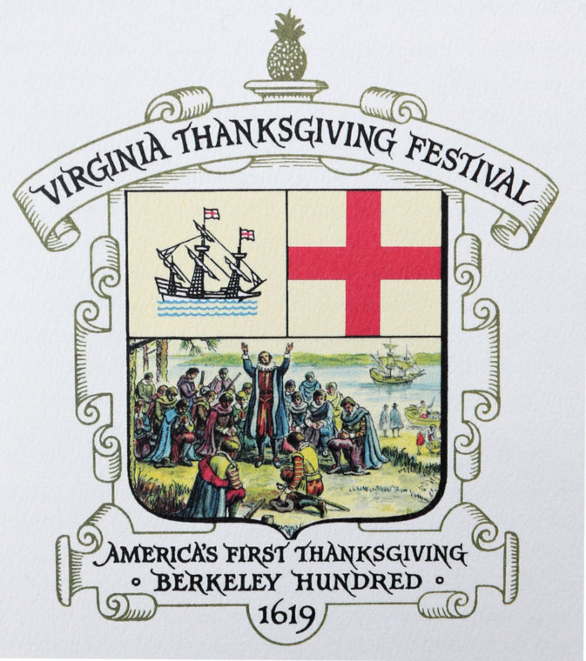
Herein lies a critical distinction between the two colonies, Virginia and Massachusetts, and it speaks directly to the topic as to why the Yankee theft of Thanksgiving is important. The system that the Virginians used was a land grant pattern based on knowledge. If you knew how to grow “X,” you were directed to land suitable to cultivate that crop. If you knew how to raise “Y,” you were granted land suitable for cultivating that given herd. Land was not equally apportioned. It was given to those who could make the best use out of the land. Furthermore, given that the Virginian colonists arrived in 1607 when Virginia was in a severe drought, the Virginians created a network of water captures capable of sustaining their crops and people, also at the direction of those who knew how to build such captures. By the time the Royalists (Cavaliers) arrived to Virginia during the Puritan ascendancy (beginning about 1624), they were able to better organize Virginia into a well-managed, socially stratified society, with a functioning government infrastructure. Order became the prevailing identity of Virginia by 1630. This was not the case for Massachusetts.
Massachusetts was founded by a religious sect, the Puritans. Puritanism was predicated on a number of beliefs that still exist within Congregationalist churches today. Puritans believed in a concept of Sola Scriptura – i.e., the Bible is the sole authority – as opposed to mainline Protestantism, which subscribes to Prima Scriptura (the Bible first, but informed, spiritual tradition is important). Another belief that the Puritans held was that Jesus Christ was both an egalitarian and a socialist (before the terms were effectively coined). In this regard, women held greater say in Puritan society, including over certain sexual mores (often for the sake of procreation, but not exclusively so). This “sexual liberation” is important, for reasons I will discuss in a moment. The Puritans further believed in equal allotments of property and yields. They abhorred profit. This is something that flies directly in the face of Jesus’ teachings, but likely was a misunderstanding of Scripture (Jesus was not a socialist, by any means).
The totality of Puritan society – religious, but egalitarian – ran directly contrary to that of Virginia – industrious and stratified by elite rank. To put this into perspective, while Virginian courts were implemented largely to settle commercial disagreements and petty crimes, the early Massachusetts courts were overwhelmed with disputes related to sexual lasciviousness. Determining who may be the father of a given child was not a dispute in a Virginia court; it was a common occurrence in Massachusetts prior to the formation of the Massachusetts Bay Colony Company in 1630 – which was designed and sent to establish order in the haphazard territory.
Going back to the Massachusetts Thanksgiving, the tradition was the product of Puritan failures, not successes. Like Virginia, the Massachusetts settlers lacked agricultural skills. Unlike Virginia, however, the Puritans attempted a socialist method of communal crop production, choosing to harvest when hungry and allocating equal portions regardless of output. As with any socialist society, lacking incentives and skills leads immediately to privation. Thus, whereas Virginia recognized and encouraged settlers with skills through generous land grants and local capitalism, Massachusetts forbade such overtures, leading to their starvation for the better part of their first year. Lucky for the Puritans, the native Pawtuxet tribe, unlike the Powhatan, were friendly and helped the Puritans survive by introducing them to the cultivation of easier grown crops (e.g., corn) and hunting. Thus, the first Thanksgiving in Massachusetts was a celebration of Indian largess, not Puritan capacity. Socialism and egalitarianism nearly doomed Massachusetts from the start.
Fast forward to the moment when Abraham Lincoln codified Thanksgiving as a celebration to give thanks to God on the fourth Thursday of November (eventually becoming the last Thursday of November). Lincoln made this declaration in 1863, largely to celebrate the turning tide of good fortune for the Union during the war. The national holiday was celebrated one week after his Gettysburg Address, honoring the Union victory. Although the Thanksgiving holiday had been celebrated throughout the United States in different ways, the adoption of Thanksgiving by Lincoln enshrined Yankee imperialism into the holiday itself.
The New England author and abolitionist, Sarah Hale, who implored Lincoln to establish the holiday, was able to imbue Yankee mythologies upon the ignorant and uneducated Lincoln. For his part, Lincoln the dedicated Marxist, likely enjoyed the elevation of socialist egalitarians who were the founding stock of his radical allies seeking to destroy the South. By 1865, the South did not have much to be thankful for, and thus tragically, the very real Southern origins of Thanksgiving – a Virginia holiday to celebrate their successes – was converted into a Massachusetts holiday, extolling the virtues of degenerates. Consequently, today, many of you celebrate a Southern holiday engrossed with Yankee iconography and mythology. If it is indeed the mission of Identity Dixie to Retake Everything than it should begin with our history and traditions.
Before I conclude this piece, it would be remiss of me not to address two other Southern states’ claims to hosting the first American Thanksgiving: Florida and Texas. Many people, typically of Hispanic origin, believe the first Thanksgiving was held in St. Augustine, Florida, in 1564, after annihilating the nearby French colony of Fort Caroline after a hurricane. Meanwhile, many Texans point toward the Thanksgiving feast of April 30th, 1595, held by Don Juan de Oñate, after his colony was nearly decimated due to a famine that occurred near El Paso. Let me address these separately, putting them to bed.
Thanksgiving is a celebration of God’s bountiful harvest. It celebrates the gifts God has given us throughout the year – which was originally food, thanks to the gift that is the North American continent for European peoples. This feast celebrates that concept. Whereas I adore my beautiful home country, Florida, and would love to give her the honorific title of the First American Thanksgiving. However, giving thanks for winning a battle is very different than the concept of thanking God for a bountiful harvest. The Spaniards of 1564 celebrated the massacre of peaceful French Huguenots. Celebrations of victories were common and not the special purpose that is Thanksgiving. Men have feasted after killing their enemies for centuries.
As for the Texas claim, it is certainly more in line with the purpose of Thanksgiving. However, the celebration was led by a Spaniard in that which would eventually become Mexico, before becoming Texas. The American Thanksgiving is just that – a unique product of American identity. The Spanish, for their part, contributed nothing to the American identity, except some people – most of whom were absorbed by successful Anglo wars against Spanish speakers throughout the first half of the 19th Century. Spanish cultures, from wherever they may derive, are a direct rejection of our Constitutional values and Anglo-Celtic norms. This is why, today, the changing demographic landscape is having a profound impact on the United States political and social landscape. It would be hard to make a claim to an American holiday when the Spanish and later Mexican governments were antithetical to that of the United States. Sorry, Texas Nationalists, but it is your Southern heritage – originating in Virginia – and not your Spanish heritage that empowers you to share in the ownership of this unique American holiday.
In sum, Thanksgiving is a Southern holiday. Thanksgiving is especially a Virginian holiday. It is time to Retake Thanksgiving by embracing those unique early Virginia qualities and eschewing Yankee perversions.
Have a Blessed Thanksgiving!
The son of a recent Irish immigrant and another with roots to Virginia since 1670. I love both my Irish and Southern Nations with a passion. Florida will always be my country. Dissident support here: Padraig Martin is Dixie on the Rocks (buymeacoffee.com)

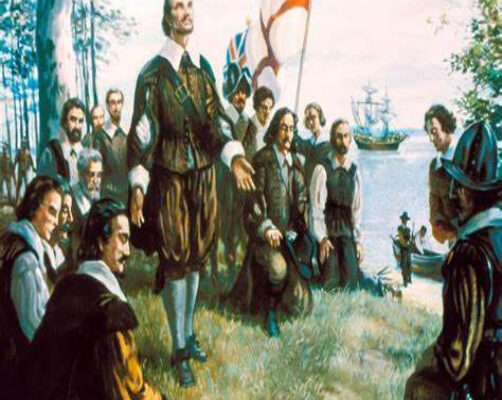

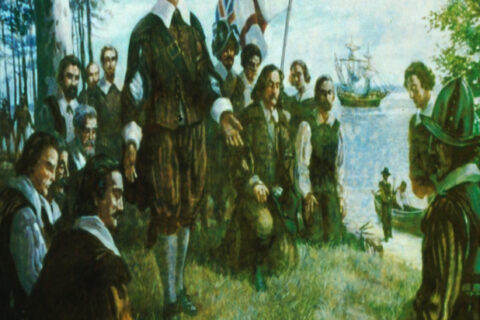
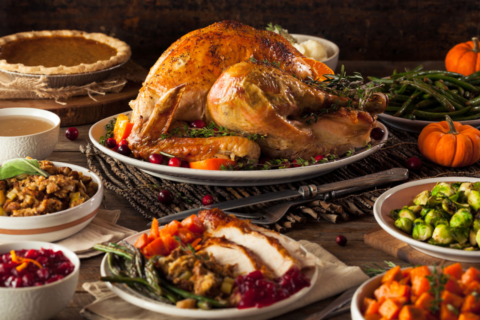
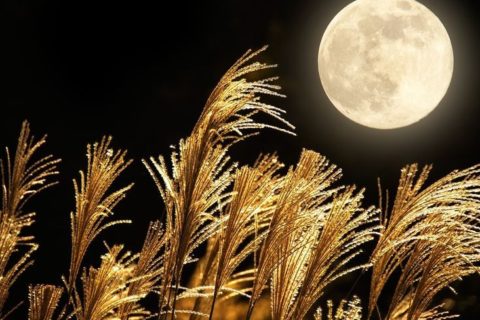
“When the second wave of settlers came, comprised of Prussian and Polish craftsmen, as well as a couple of women, they too lacked the skills to develop sustainable food. Still, that which began as a small group in 1607, grew to nearly five hundred settlers. Ultimately, a time called the “Starving Time” wiped out almost 80% of the colony during the winter of 1609-10, largely due to their lack of agrarian capacity.”
It looks like it wasn’t just lack of skills; communism almost wiped out this colony, just like the Pilgrims.
https://mises.org/library/fall-communism-virginia
Thanks for this dose of history! As a southerner just coming off of 2 years in Massachusetts, it amused me to no end how much they “took for granted” their status as a bastion of Americana. Even kids were of the unconscious (and conscious) mindset that this state was the epitome of being american.
That said, they do have the advantage of not having had their history interrupted by the Civil War. And to me it really shows in the rural communities, it’s amazing how many can trace their family back a few hundred years. Whereas here, that usually doesn’t extend past the great depression.
Jamestown was founded during the height of the little ice age. Geologists now believe that the first year of settlement was colder than any winter in the prior thousand years. Which meant that cereal crops planted in the northern hemisphere only produced about a quarter of the amount of edible grain that was normally produced. The weather has less impact on fruits and vegetables, but it meant that the main source of human calories was dangerously low everywhere and that animal feed was obscenely low that year. Even wild game would have been thinner that year. It was a rough year for the entire world, added on top of all the hardships that you identified.
Sola Scriptura îs one of the five Solas of the Reformation. It was believed and accepted by all Protestants. Prima Scriptura is a Catholic doctrine just like Free Will. Mainline protestants have been mislead. 2 Tim 4:3, the time will come when men will not endure sound doctrine.
“…held by Don Juan de Oñate, after his colony was nearly decimated due to a famine…”
So, you’re saying the famine killed almost, but not quite, ten percent of the members of the colony?
This is an excellent article and I learned much from it, but I sense that sola scriptura and Puritanism may have been given short shrift. R.L. Dabney (certainly no New England Puritan) writes:
“Whosoever squares his action by any Rule, either divine or human, he is a Puritan. He that will not do whatsoever other men would have him do, he is a Puritan. It was the taunt of a relaxed and unprincipled party against those who tacitly shamed their lack of principle, by professing to live strictly by their principles. In the United States, the time was when those who asserted the fundamental principles of the Constitution as the practical rules for administering the government, were branded as “Abstractionists.” The Puritans were simply the abstractionists of 1640. All those who were against a despotic power were Puritans. Charles I resolved to ruin all such as were not submissive to his will by confounding them all under the name of Puritans.” pp. 39-40.
R. L. Dabney, ‘John Milton’, ‘The Land We Love’, Vol. 3